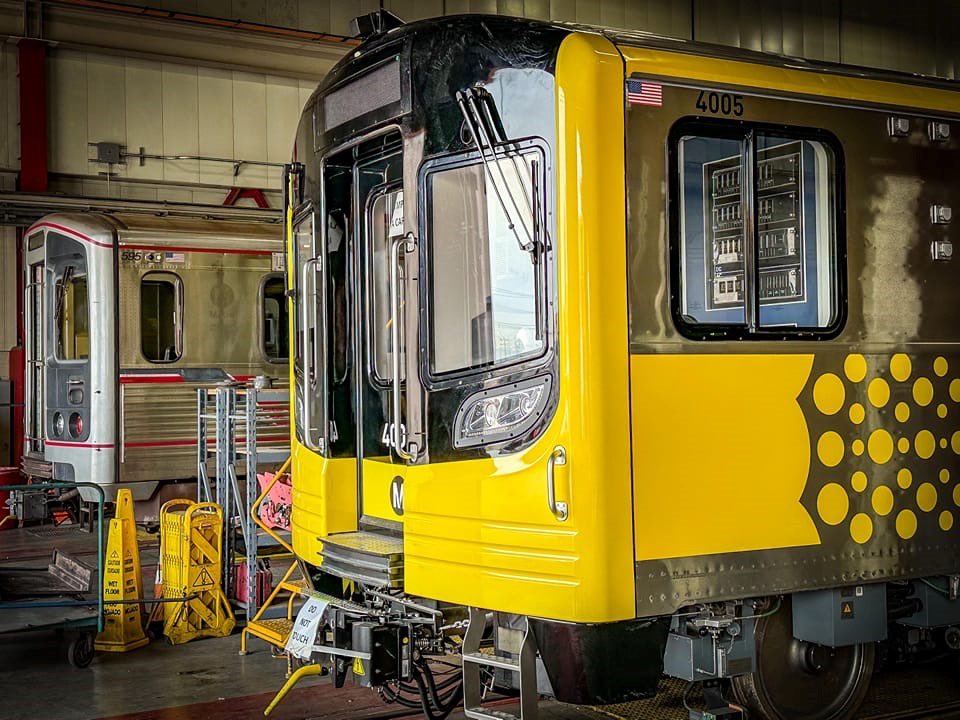Briefings: Philly Transit Agency Drops CRRC As Future Railcar Work Dwindles…
Weeks after reports appeared that MGM Resorts International is considering selling MGM Springfield, another blow has come to a city economic anchor. The Southeastern Pennsylvania Transportations Authority, or SEPTA, has cancelled a contract with CRRC, the Chinese railcar builder on Page Boulevard in Springfield.
CRRC, which the government of China owns, has had very public issues with its Massachusetts Bay Transportation Authority contract. Cars to replace ancient rolling stock on the MBTA’s Red and Orange lines have faced repeated delays. The agency decided last month to continue with CRRC and take steps to secure delivery sooner than CRRC had estimated. This is still far later than CRRC originally promised.
SEPTA had ordered bilevel cars for its Regional Rail service in Philadelphia. Its Regional Rail shares characteristics with commuter rail on the MBTA or Metro-North in Connecticut and New York. SEPTA also has distinct “heavy rail” rapid transit similar to the Red and Orange subway lines in Boston.
According to The Philadelphia Inquirer, which first reported the cancellation, SEPTA ended the contract “for cause.” Shoddy work and delays, not unlike complaints the MBTA has had, were a factor. The agency is assessing options to recoup $50 million it has already spent.
In its statements to The Inquirer and The Boston Globe, CRRC’s spokesperson indicated it was still trying to get the SEPTA project back on track.
With SEPTA pulling out, the CRRC Springfield facility only has the MBTA work and some cars for heavy rail lines in Los Angeles.
However, the Los Angeles County Metropolitan Transportation Authority declined its option to buy more cars. Then, LACMTA turned to Hyundai Rotem to buy cars it will need for the impending Wilshire Boulevard extension.

An HR4000 railcar, CRRC’s only other ongoing contract now. Pictured in Lala Land, its predecessor is lurking in the background. (via Twitter/@Numble)
A CRRC subsidiary also has a contract for the Chicago “L” or elevated. However, the assembly line for these cars is in Chicago.
CRRC had intended to make its Springfield plant a base for expansion into the North American market. The Commonwealth of Massachusetts wanted to try to distribute some benefits from an MBTA railcar purchase to Western Massachusetts.
Massachusetts required some construction occur in state, namely outside the Boston area. However, this mandate disqualified the contract from federal funding. All bidders planned to perform considerable work in Asia. CRRC committed to building its factory at the former Westinghouse plant in Springfield. Its bid came in below even the MBTA’s estimates. Hyundai Rotem proposed to do final work at another site in Springfield. The third, Kawasaki, planned final work for Hopedale in Worcester County.
CRRC’s bids have come in low for other contracts, too. Rival bidders have cried foul, accusing China of subsidizing CRRC to keep bids low.
While this effort was an initiative of Governor Deval Patrick, it fell to his successor, Charlie Baker, to implement and oversee production. CRRC blamed the pandemic and tariffs on the railcar shells, which are built in China, for delays. However, MBTA exercised insufficient oversight, identifying problems but rarely acting on them.
All 404 cars for both MBTA lines were due last September. Later estimates put final delivery in 2029.
The agency decided to stick with CRRC last month after determining a new bid would delay desperately needed replacement cars. Some Red Line rolling stock dates to the 1960s. The MBTA is paying $148 million extra, largely bringing the cost closer in line to original agency estimates. The last car should now arrive in 2027.
By itself, SEPTA’s about-face is minor. It is only 45 cars. Unlike the MBTA or LACMTA, SEPTA has received no cars yet. Some even question bilevel cars for Regional Rail as commuting habits have changed. But without any work beyond completing the Los Angeles and Boston orders, the factory’s fate is in doubt.
Ironically, this comes at a time of massive rail investment, at least by United States standards. President Joe Biden’s Infrastructure Investment and Jobs Act includes investments in Amtrak, commuter rail and urban transit. German and Swiss companies have expanded into the American market, competing with incumbent French and Japanese manufacturers and their subsidiaries.
The MBTA now has an option to buy CRRC’s factory should it close. Now may be the time to start shopping around for companies to buy it, either from CRRC or the MBTA, to preserve its future in Springfield.


No comments:
Post a Comment
Note: Only a member of this blog may post a comment.